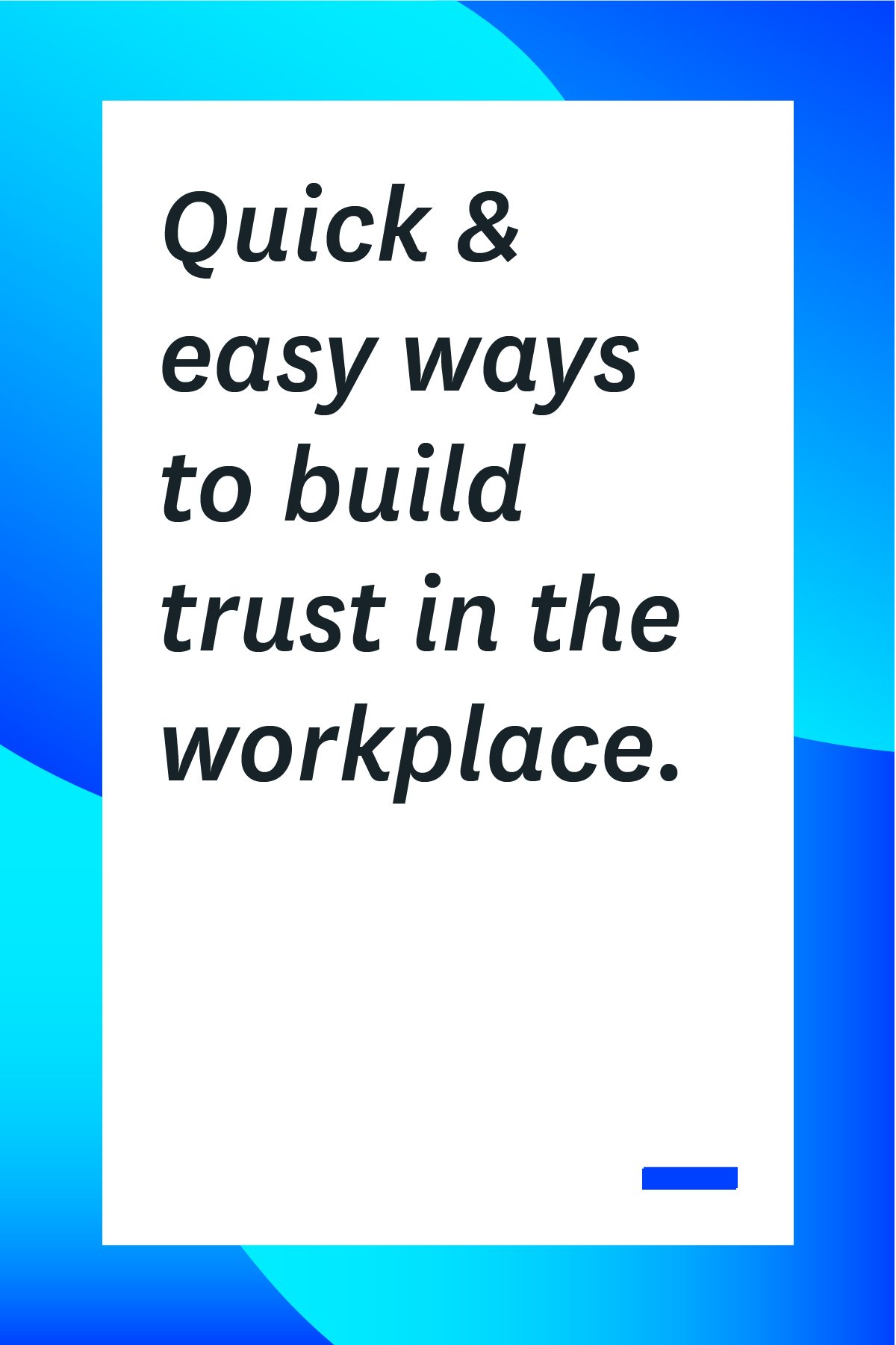
Tips for Building Trust in the Workplace | Monster.com
Tips for Building Trust in the Workplace
Take these steps to forge genuine relationships with your coworkers.
Daniel Bortz, Monster contributor
Trust is at the core of any professional relationship.
Building trust in the workplace is at the core of every professional relationship. Trustworthiness is absolutely necessary in order to establish not only your reputation, but also a strong network of people who will help you throughout your career.
It goes without saying: No one person is responsible for the success of a company; it's a team effort. In order to achieve results in any organization, there is an interlocking chain of events that needs to happen. People rely on each other in the workplace.
But that reliance can't exist without trust. More than just a buzzword to throw around, trust is a reflection of your character, and coworkers will work harder for people they trust. That, in turn, helps produce above-and-beyond results.
Follow these tips for building trust in the workplace with your peers, subordinates, and superiors.
Tips for Building Trust in the Workplace
- Give Coworkers Praise When It's Due
- Avoid Office Gossip
- Share Information
- Trust Others
- Invest in Your Employees' Development
- Be Consistent
- Pay Attention to Non-verbal Communication
- Welcome New Hires Graciously
1. Give Coworkers Praise When It's Due
One way to cultivate authentic relationships with your peers is to praise their work. Give credit to others, and you'll be seen as gracious, just as long as you're being genuine in your praise. Furthermore, you need to be prompt in your praising. A team meeting, for example, is a natural setting to celebrate a coworker's big career achievement or say thank you for someone's help with a project. Don't wait until a month after the fact, or when nobody is around, to let your coworker know you appreciate them.
2. Avoid Office Gossip
We know this is easier said than done, but the plain truth is office gossip can be toxic. Furthermore, gossiping doesn't even build trust with the people you're gossiping with because they're going to fear you'll do the same thing to them. A better coping mechanism? When you're frustrated with a coworker, vent to someone outside the company.
If you have an issue with a coworker, try to resolve the problem with the person in private before bringing it to your boss.
3. Share Information
Being perceived as a team player by your coworkers builds trust, but you have to take steps to shape your image.
Let's say you attended an industry conference. Rather than hogging all you learned so that only you can benefit, sharing what you learned with your peers can help establish credibility as a team player.
But it's important to have the right intentions. If your goal is to bolster your colleagues' and peers' professional development and successes, you'll build trust. But if you're just sharing because you want something in return, odds are your peers are going to pick up on that and trust you less.
4. Trust Others
This sounds like a no-brainer, but if you view others as trustworthy, chances are they'll reciprocate. Give your coworkers all the help they need from you, then trust them to execute.
This goes doubly if you're someone's manager. Many supervisors unintentionally micromanage their employees, and that can be a huge blow to building trust.
To avoid over-meddling, set check-in meetings—say, once a week or once a month—so that you can effectively oversee your direct reports without hovering over their shoulder.
5. Invest in Your Employees' Development
If you manage others, part of your job is to help your direct reports grow by gaining new skills and sharpening the skills they already have. To do that though, you have to provide them with honest feedback—a combination of praise and constructive criticism—on a regular basis.
Performance reviews are another opportunity to build trust with your direct reports. People tend to trust leaders who make them feel valued. By asking your employees what you can be doing to better support their work, you'll not only solidify a good work relationship but also boost their level of engagement.
6. Be Consistent
Leaders want people who routinely exceed their expectations—meaning you have to produce excellent work day in and day out. No one on your team should have to wonder whether you're going to deliver. You need to be trusted to do your job well and also deliver results on time.
Not only does your performance need to be consistent, but so should your mood. Be the kind of person who can be counted on to keep a calm, cool, and collected mind, otherwise you'll sabotage the level of trust people have in you
7. Pay Attention to Non-verbal Communication
Your body language can help you build trust with coworkers, but it can also undermine your efforts if you're not careful. Research shows a slumping posture or crossed arms can turn people off. Conversely, making eye contact and nodding to show your interest can help build trust. Create a welcoming atmosphere for others so they don't hesitate to approach you. Being open to your coworkers will make them feel invited to share ideas and feedback with you.
8. Welcome New Hires Graciously
Managers play a crucial role in their company's onboarding process, which can be a great way of boosting employee retention. (One survey from Paycom found that a great onboarding experience can reduce turnover by 157% and boost employee engagement by 54%.) That's why it's important for supervisors to make new hires feel welcome. Even small gestures, like taking someone out for coffee or lunch, can enable you to build rapport and trust from the start.
Boost Your Value
The workplace can be a beast to tackle, so being someone that others can go to for advice can make you a valuable employee—the kind companies dream of hiring. The more you work on building trust in the workplace, the more useful you can be to others. Want some help with that? Monster has tons of free resources. We can send you career advice and job search tips to help boost your worth, whether that's through leadership lessons, negotiating skills, or good ol' fashioned communication. When others look to lean on you, know you can lean on the expert knowledge from Monster.



/GettyImages-463246035-5b6090fd46e0fb0025acb86e.jpg)






